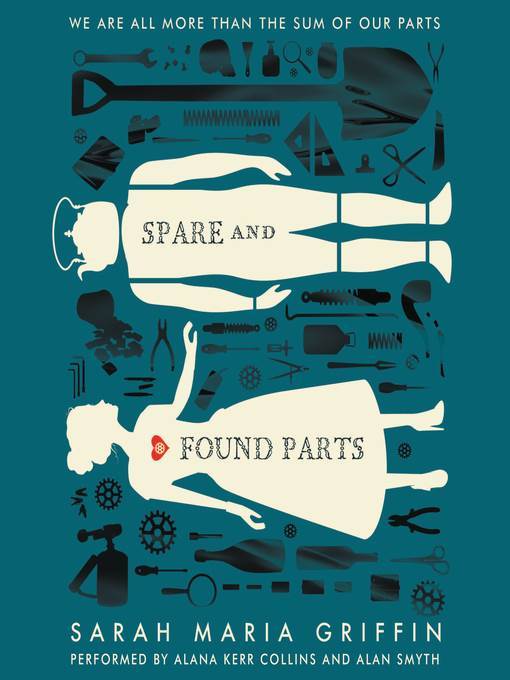
Spare and Found Parts
کتاب های مرتبط
- اطلاعات
- نقد و بررسی
- دیدگاه کاربران
نقد و بررسی

October 10, 2016
“Could you make a soul out of spare and found parts?” It’s been more than 100 years since an event known as the Turn, and people now live without the computers and technology that brought about destruction and sickness. Nell Crane lives with her father, Dr. Julian Crane, in the Pale, home to those born without limbs and other body parts. Julian creates wondrous mechanical limbs for those who need them, and Nell, self-conscious about her mechanical heart, is under pressure to present a creation of her own to the Youth Council. She longs to build something more impressive than the tiny bots she assembles, and out of this longing an idea is born: Nell will build a boy, someone who will see past her scar. Irish author Griffin’s lovely U.S. debut is a quietly effective cautionary tale about a world still reeling from past mistakes. The steady ticking of Nell’s heart provides a drumbeat for her aching loneliness, her grief over the death of her mother, and her quest—despite catastrophic betrayal—to understand what it means to be alive. Ages 14–up. Agent: Simon Trewin, William Morris Endeavor.

September 1, 2016
Gr 9 Up-Griffin's richly descriptive writing exquisitely evokes a dark, dank dystopian world destroyed by humans' obsession with computers. Sixteen-year-old Nell lives with her mad scientist father, Julian, who is widely respected for his fantastical prosthetic creations. When Nell was young, Julian implanted a ticking heart in her, but he couldn't save Nell's mother. Nell's incessant ticking, coupled with the expectation that she live up to the reputations of her parents, both renowned scientists, causes her to feel like an outsider. Enter Io: Nell creates a robot of sorts, using spare and found parts, such as a ladder (for the spine), a mannequin hand, and a teakettle (for the head). An illicit, stolen computer provides the brain. Not quite sci-fi, not quite fantasy, this quirky nod to Frankenstein will delight some readers and confuse others. Io kindly acts as a caretaker for Nell. Initially, Nell's revolutionary project alienates her friends. But in a hurried ending, she discovers the truth about her parents and her friends rally their support as Nell verges on the cusp of greatness. Griffin's strength lies in her ability to perfectly convey the mood and tone of her Burton-esque world. Unfortunately, absurd moments (Nell kissing a teakettle), a slowly evolving story, and the awkward use of shifting narrative perspectives conflict with her skillful writing. VERDICT This work may have a niche audience, but readers who are fond of rich, descriptive writing and can bypass certain preposterous situations will find a treasure in this Frankenstein-inspired tale.-Laura Falli, McNeil High School, Austin, TX
Copyright 2016 School Library Journal, LLC Used with permission.

August 1, 2016
A lonely, motherless girl with a clockwork heart risks everything to create a mechanical friend in a futuristic Ireland where computers are forbidden. After an ill-defined technological crisis known as the Turn caused a devastating epidemic, Ireland was divided into Pale and Pasturesick and welland now spurns all but the most necessary technology. The citizens of the Pale are all missing parts, but prostheses are "augmentations" rather than disadvantages. Gay and gender-fluid characters appear without remark. Dark-haired, brown-skinned Nell Starling-Crane, whose father fashions the sophisticated prostheses, is nevertheless set apart; she's the only citizen with a mechanical heart, the loud ticking of which makes her self-conscious. Contributing to adult society is crucial for avoiding a life in stonework or marriage, but despite a looming project deadline, Nell has no ideasuntil she decides to build a sentient android companion from ancient computer parts, defying the law against artificial intelligence. Griffin explores the ethical quandaries of progress, love, class, and ambition in language as ornate as the characters' decorated prostheses; sometimes a phrase catches the eye, and sometimes the heavy mix of metaphors almost camouflages the story underneath. Chapters alternate between third-person accounts of Nell's exploits and second-person observations of Nell's past and present. The observer is not always clear, which makes the perspective shifts disorienting. Nevertheless, the plot is compelling, full of secrets, blackmail, and betrayals that resolve at just the right momentsconvenient, yes, but satisfying. Though occasionally uneven, this poetic, Frankenstein-esque tale forms a page-turning whole. (Science fiction. 13 & up)
COPYRIGHT(2016) Kirkus Reviews, ALL RIGHTS RESERVED.

A lonely, motherless girl with a clockwork heart risks everything to create a mechanical friend in a futuristic Ireland where computers are forbidden. After an ill-defined technological crisis known as the Turn caused a devastating epidemic, Ireland was divided into Pale and Pasture--sick and well--and now spurns all but the most necessary technology. The citizens of the Pale are all missing parts, but prostheses are "augmentations" rather than disadvantages. Gay and gender-fluid characters appear without remark. Dark-haired, brown-skinned Nell Starling-Crane, whose father fashions the sophisticated prostheses, is nevertheless set apart; she's the only citizen with a mechanical heart, the loud ticking of which makes her self-conscious. Contributing to adult society is crucial for avoiding a life in stonework or marriage, but despite a looming project deadline, Nell has no ideas...until she decides to build a sentient android companion from ancient computer parts, defying the law against artificial intelligence. Griffin explores the ethical quandaries of progress, love, class, and ambition in language as ornate as the characters' decorated prostheses; sometimes a phrase catches the eye, and sometimes the heavy mix of metaphors almost camouflages the story underneath. Chapters alternate between third-person accounts of Nell's exploits and second-person observations of Nell's past and present. The observer is not always clear, which makes the perspective shifts disorienting. Nevertheless, the plot is compelling, full of secrets, blackmail, and betrayals that resolve at just the right moments--convenient, yes, but satisfying. Though occasionally uneven, this poetic, Frankenstein-esque tale forms a page-turning whole. (Science fiction. 13 & up) COPYRIGHT(1) Kirkus Reviews, ALL RIGHTS RESERVED.

























دیدگاه کاربران